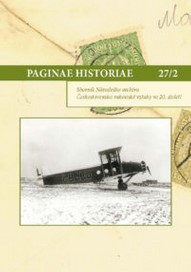STAVOVSKÝ STÁT V RAKOUSKU VE 30. LETECH 20. STOLETÍ. JEHO RECEPCE MEZI KATOLICKÝMI INTELEKTUÁLY A POLITICKÝMI KATOLÍKY V ČESKOSLOVENSKU
THE CORPORATE STATE IN AUSTRIA IN 1930S AND ITS RECEPTION IN CZECHOSLOVAKIA
Author(s): Marek ŠmidSubject(s): Christian Theology and Religion, Political history, Government/Political systems, Politics and religion, Interwar Period (1920 - 1939)
Published by: Národní archiv
Keywords: 1932–1938; Corporate state in Austria; Czechoslovak People’s Party; Papal Encyclical Quadragesimo anno;
Summary/Abstract: The study is focused on the Czechoslovak reception of events in Austria between 1932–1938. It follows, mostly chronologically, important milestones, key personalities and significant conflicts that shaped the form of the Corporate state in Austria in 1930s. Based on these, as much as the historical sources allow it, it reflects both dramatic events of Austrian inner politics and their protagonists, while the attention is also paid to the Catholic milieu in Czechoslovakia, including the Czechoslovak People’s Party with its Chairman Jan Šrámek. It analyses the reception of social ideas from the Papal Encyclical Quadragesimo anno from 1931 in Austria as well as its implementation into the constitution of the Corporate state in 1934. In a comprehensive part, it details how much the papal principles of solidarity and subsidiarity lacked in the authoritarian conception of the Austrian state in 1930s that pushed them through from above with no regard to papal rules and principles of the public discourse. The authoritarian conception was well received by the Czech catholic thinkers that found it inspiring for the home milieu, hoping that a spiritual regeneration of the Czech society and preference of the Catholic faith in everyday life in Czechoslovakia would come with it.
Journal: Paginae Historiae
- Issue Year: 27/2019
- Issue No: 2
- Page Range: 93-105
- Page Count: 13
- Language: Czech

